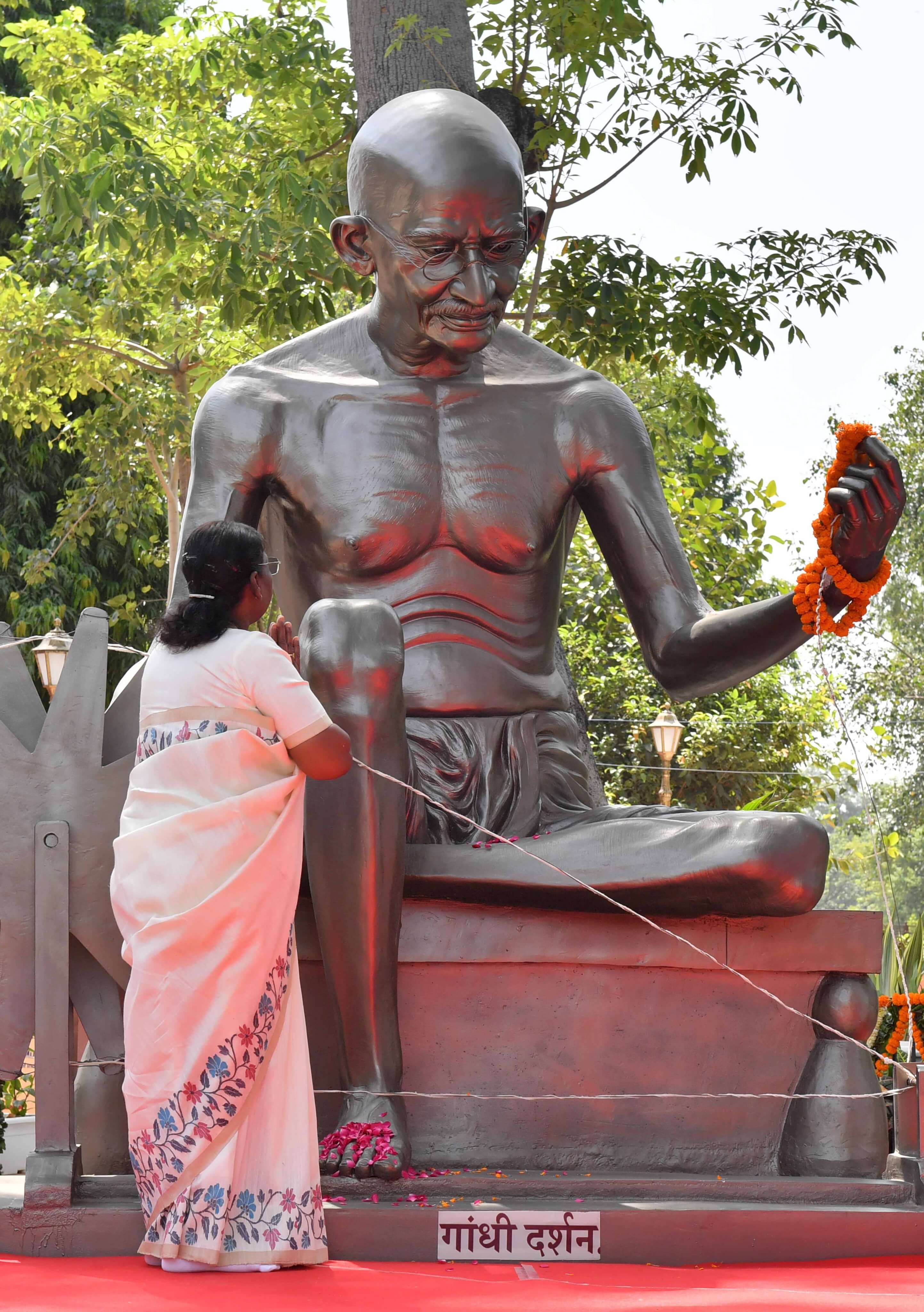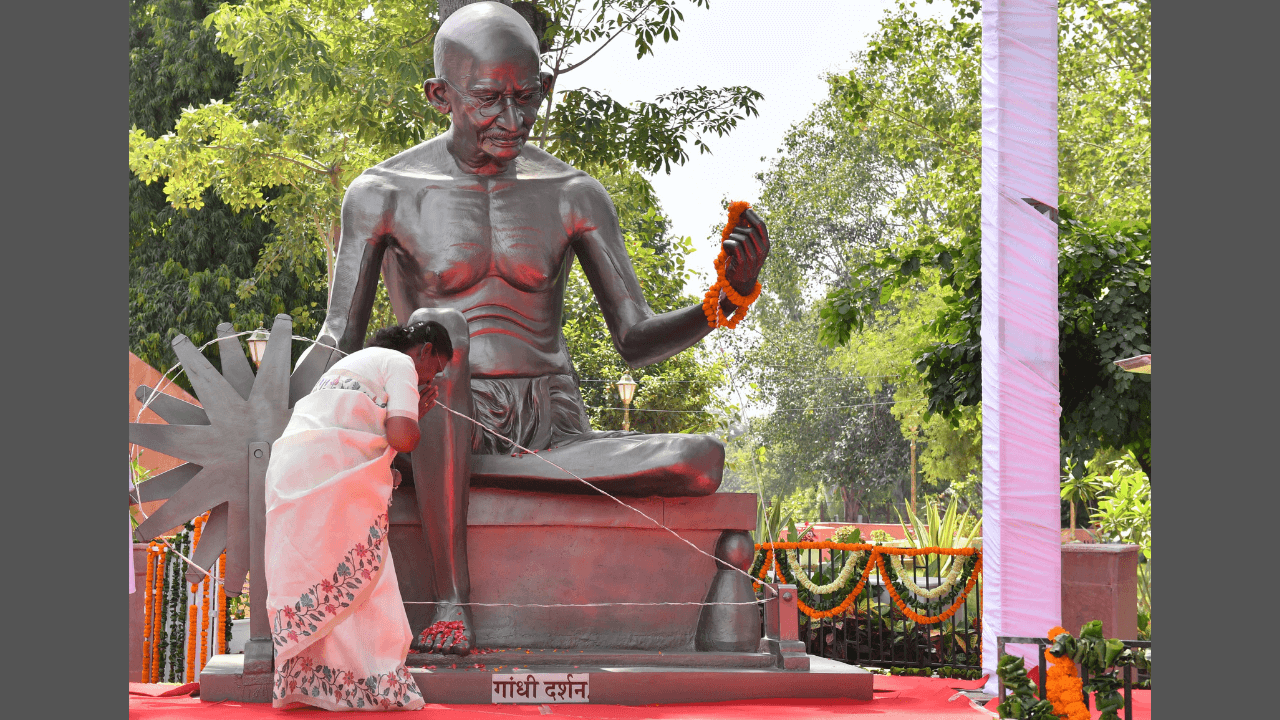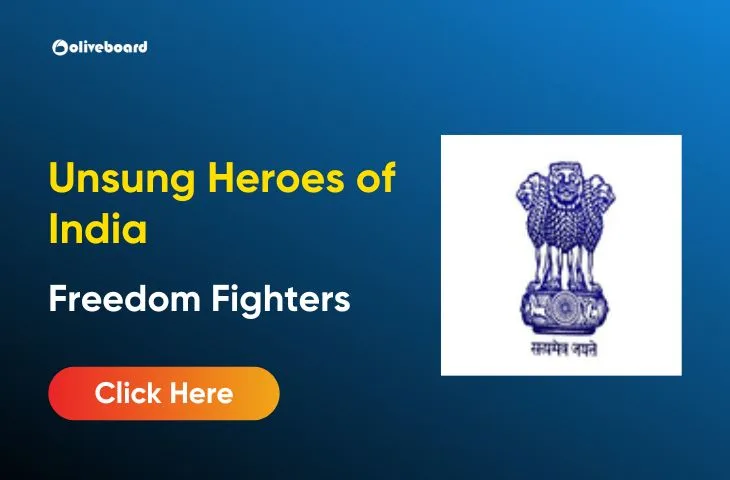The President of India, Smt. Droupadi Murmu unveiled a 12-foot-tall statue of Mahatma Gandhi and inaugurated the ‘Gandhi Vatika’ at Gandhi Darshan in New Delhi on September 4, 2023. This ceremony marks a significant tribute to the legacy and ideals of Mahatma Gandhi, the Father of the Nation, and serves as a place of reflection and inspiration for visitors.
More About the News

As part of efforts to enhance the visitor experience, a selfie point has been established within Gandhi Vatika. This unique area features multiple statues of Mahatma Gandhi, depicting him in various postures.
During the inauguration, the President expressed that Mahatma Gandhi’s ideals and values have had a profound impact on the world. She highlighted that Gandhi advocated for non-violence during a time when the world was grappling with hatred and discord during the world wars. The President emphasized that his commitment to truth and non-violence elevated him to the status of a great human being. She mentioned that Mahatma Gandhi’s statues are erected in numerous countries, and people worldwide believe in his principles.
Gandhi Darshan Complex
- The impressive 12-foot-tall statue of Mahatma Gandhi will stand proudly at the entrance of the 45-acre Gandhi Darshan complex.
- This sprawling complex is situated near the memorial of Mahatma Gandhi at Rajghat, the sacred site where the revered leader was cremated.
- The statue serves as a poignant and fitting tribute to the Father of the Nation, Mahatma Gandhi, who played a pivotal role in India’s struggle for independence through the practice of non-violence and his unwavering commitment to truth and justice.
Gandhi Vatika
- Adjacent to the statue, the ‘Gandhi Vatika’ is designed to provide a serene and peaceful haven for visitors.
- This tranquil garden area offers an ambiance conducive to reflection and contemplation, making it an ideal spot for visitors to connect with the profound legacy of Mahatma Gandhi.
- The ‘Gandhi Vatika’ is a fitting addition to the surroundings of Rajghat, a place of profound historical and cultural significance for India, where Mahatma Gandhi’s cremation memorial stands as a lasting symbol of his enduring impact on the nation and the world.
Significance
Celebrating 75 Years of Independence and the G20 Presidency
- The inauguration of the statue and ‘Gandhi Vatika’ carries significant significance as it aligns with the celebration of India’s 75th year of independence, a momentous milestone in the nation’s history.
- Furthermore, it serves as a tribute to India’s G20 presidency, highlighting the country’s role on the international stage.
- The presence of President Murmu at the event underscores the government’s unwavering commitment to honoring the enduring legacy of Mahatma Gandhi, a global icon of peace and non-violence.
- It also signifies India’s dedication to showcasing its influence and contributions in the global arena, emphasizing its commitment to the ideals of truth, non-violence, and social justice championed by Mahatma Gandhi.
A Symbol of Unity
- As a symbol of India’s G20 presidency, flags representing member nations have been prominently displayed at Gandhi Darshan.
- This meaningful gesture serves as a visual representation of India’s position as a responsible global player, emphasizing the country’s commitment to fostering cooperation and unity among nations.
- It underscores India’s role in promoting international collaboration and addressing global challenges while upholding the principles of peace, cooperation, and diplomacy.
Renovation
- The Gandhi Darshan complex, where these notable additions are taking place, unfortunately, experienced damage as a result of recent floods.
- The library within the complex, which houses valuable books, was particularly affected.
- Vice Chairperson Vijay Goel has provided assurance that the renovation efforts are actively in progress and are anticipated to be completed within the span of two months.
- These efforts aim to restore and preserve this important cultural and historical site, ensuring that it continues to serve as a place of reverence and learning for generations to come.
About Mahatma Gandhi
Mahatma Gandhi was a lawyer, anti-colonial nationalist, and political ethicist who employed nonviolent resistance to lead the successful campaign for India’s independence from British rule. He is internationally honored for his philosophy of nonviolence and his leadership of the Indian independence movement.
Early Years
- Gandhi was born Mohandas Karamchand Gandhi on October 2, 1869, in Porbandar, Gujarat.
- He was the youngest son of Karamchand Gandhi, the chief minister of Porbandar, and Putlibai.
- Gandhi was educated in Porbandar and Rajkot.
- In 1887, he went to England to study law.
- He returned to India in 1891 and began practicing law in Bombay.
Experiences in South Africa
- In 1893, Gandhi went to South Africa to represent a Muslim client in a court case.
- While in South Africa, he became involved in the struggle of Indian immigrants against racial discrimination.
- He led protests against unfair treatment of Indians and organized boycotts of British goods.
- He also developed his philosophy of nonviolence, which he called satyagraha.
Satyagraha in India
- In 1915, Gandhi returned to India and soon became involved in the independence movement.
- He led protests against British rule and organized boycotts of British goods.
- He also founded the Non-Cooperation Movement and the Quit India Movement.
- Gandhi’s nonviolent methods were successful in achieving India’s independence in 1947.
However, he was disappointed that the independence of India led to the partition of the country and the creation of Pakistan. He was assassinated on January 30, 1948.
Gandhi is considered the father of modern India. He is also one of the most important figures in the history of nonviolent resistance. His philosophy of nonviolence has inspired movements for civil rights and freedom around the world.
Gandhi’s most famous quotes
- “Be the change you want to see in the world.”
- “An eye for an eye will only make the whole world blind.”
- “Strength does not come from physical capacity. It comes from an indomitable will.”
- “Nonviolence is the greatest force at the disposal of mankind. It is mightier than the mightiest weapon of destruction devised by the ingenuity of man.”
- “The weak can never forgive. Forgiveness is the attribute of the strong.”
Gandhi’s legacy is a powerful one. He showed the world that nonviolent resistance is a powerful force for change. His words and actions continue to inspire people around the world to fight for justice and equality.
- Weekly Current Affairs 2025 PDF For Bank, SSC, UPSC Exams
- Unsung Heroes of India: 10 Unknown Freedom Fighters You Should Know
- 26 December Current Affairs 2023 in English
- Daily Current Affairs 2025, Check Today’s Current Affairs
- April Month Current Affairs 2024, Download PDF
- June Month Current Affairs 2024, Download PDF

Hello, I’m Aditi, the creative mind behind the words at Oliveboard. As a content writer specializing in state-level exams, my mission is to unravel the complexities of exam information, ensuring aspiring candidates find clarity and confidence. Having walked the path of an aspirant myself, I bring a unique perspective to my work, crafting accessible content on Exam Notifications, Admit Cards, and Results.
At Oliveboard, I play a crucial role in empowering candidates throughout their exam journey. My dedication lies in making the seemingly daunting process not only understandable but also rewarding. Join me as I break down barriers in exam preparation, providing timely insights and valuable resources. Let’s navigate the path to success together, one well-informed step at a time.






